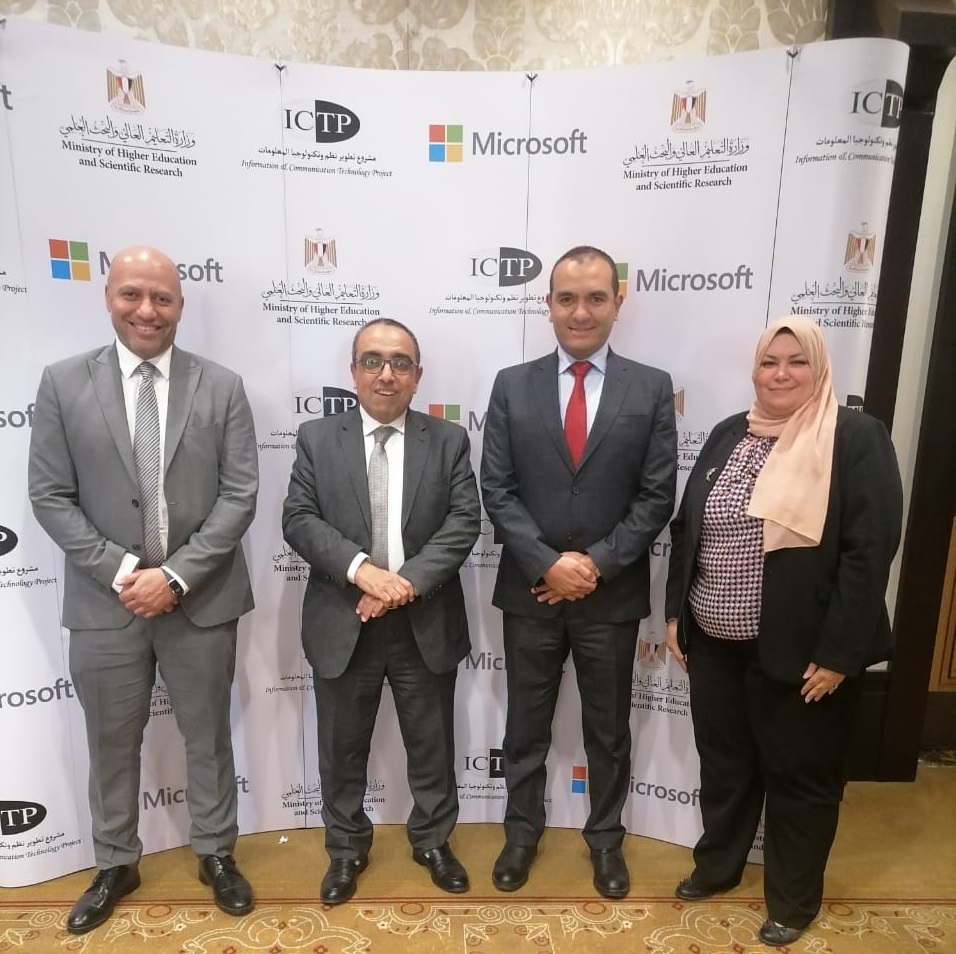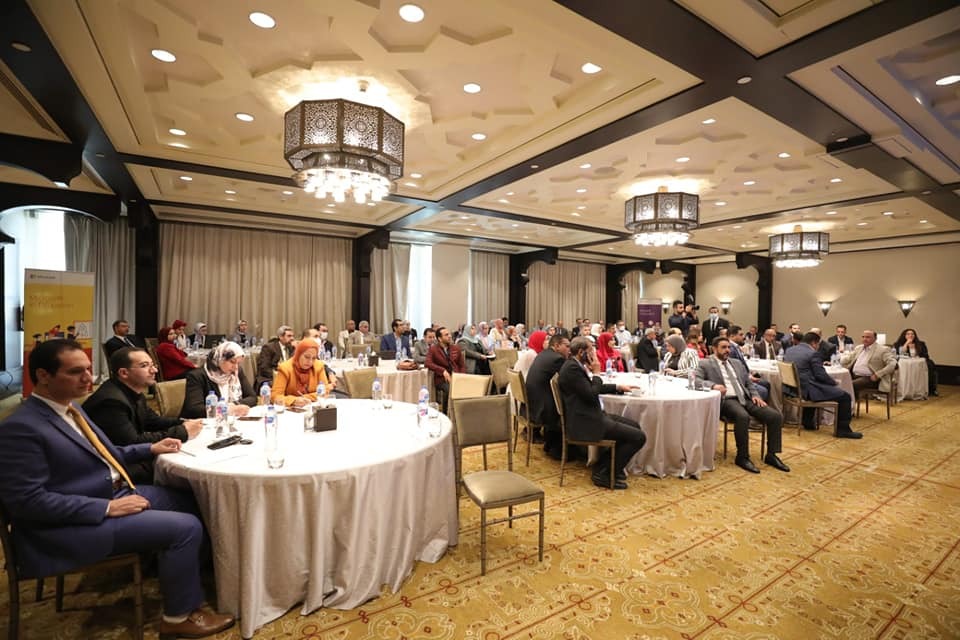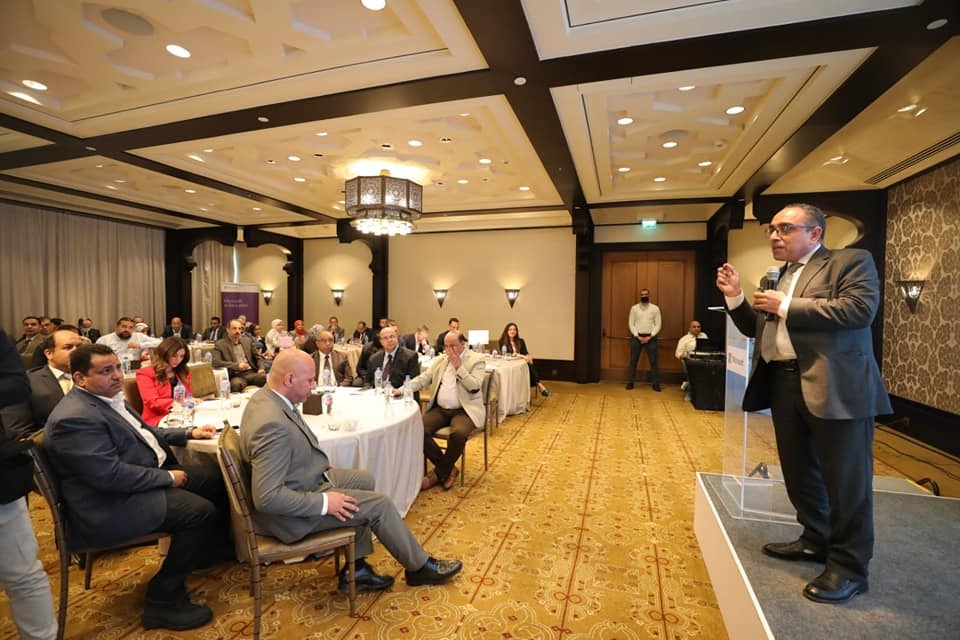Opening of the first edition of the annual Microsoft Higher Education Conference
Under the auspices of Prof. Dr. Khaled Abdel Ghaffar, Minister of Higher Education and Scientific Research, held this morning, Wednesday, the first edition of the annual Microsoft Conference for Higher Education, which is held in cooperation between the Project Development Unit of the Ministry of Higher Education and Microsoft International, under the supervision of Dr. Hesham Farouk, Assistant Minister for Digital Transformation, and Eng. Nasser Al-Amir, Executive Director of the Information Systems and Technology Development Project (ICTP), in the presence of Mr. Ahmed El Sheikh, Permanent Undersecretary of the Ministry, Mr. Mohamed Abu Zeid, Undersecretary for the Minister’s Office Sector Affairs, and a number of Ministry leaders.
This took place in the presence of Dr. Islam Hegazy, Director of the Network and Information Technology Center at Ain Shams University, and Prof. Dr. Rasha Ismail, director of the university's electronic portal.
The conference aims to shed light on the role of Microsoft in the higher education sector, and how to benefit from experts in this field, in line with Egypt's plan for digital transformation.

In his speech, Dr. Hesham Farouk, Assistant Minister for Digital Transformation, praised Microsoft’s global efforts and fruitful cooperation in the higher education sector, praising the existing cooperation between it and the Ministry of Higher Education in implementing the digital transformation plan, stressing the ministry’s keenness to cooperate with international companies and benefit from its experiences in this field, referring to the efforts which is carried out by the Ministry through the Digital Transformation Unit, the Project Management Unit and the Knowledge and Electronic Services Center of the Supreme Council of Universities; To implement the digital transformation plan in universities.
Dr. Hesham Farouk reviewed the most important 5 projects that the ministry is undertaking in the field of digital transformation in the coming period, in addition to the ongoing mega projects, such as electronic tests and e-learning systems Thinqi, explaining that the five projects are (a digital student initiative), which aims to prepare a capable student and graduate. To use modern digital technological means, spread the culture of digital transformation in the academic community, eliminate electronic illiteracy among university students, and refine them with the technological skills necessary to keep pace with technological changes in the labor market and qualify them for future jobs.
As pointed out by Dr. Farouk that (Virtual Laboratories) project, aims to provide simulation of laboratories that allow students to practice practical inside them, to raise their practical abilities, upgrade students’ skills, and improve knowledge delivery by providing ways for interaction between the student and the scientific material, referring to the (Securing Books) project and the benefit it will achieve. Saving paper import costs and printing expenses, ease of access to scientific material, and protection of intellectual property rights, indicating that it has already been applied in a number of universities.

Dr. Farouk pointed out the (ERP project for mechanizing assets in Egyptian universities), which aims to simplify administrative processes and achieve better management of financial affairs in universities, and the (secured certificates) project, which is being implemented in public universities, and is currently working on its circulation in private universities as well.
For his part, Eng. Nasser Al-Amir affirmed the ministry’s keenness to apply the highest quality standards in implementing the digital transformation plan, and to work with the latest international systems, in implementation of the political leadership’s directives to scrutinize standards for implementing new projects, and to implement the highest levels of quality and mastery, noting that the ministry observes the standards of Trust and transparency, working through integrated work teams, benefiting from distinguished experts and scholars in the fields of technology and digital transformation from Egyptian university professors, and cooperating with distinguished international companies in this field.
For her part, Engineer Mirna Aref, General Manager of Microsoft Egypt, thanked Dr. Khaled Abdel Ghaffar, Minister of Higher Education and Scientific Research, for his support for this partnership between the ministry and Microsoft. To implement the digital transformation plan in universities, and for its future vision on the importance of keeping pace with technological developments within educational institutions, noting that Microsoft is proud of its long-term partnership with the Ministry of Higher Education and Scientific Research, and in cooperation with the distinguished minds and expertise of Egyptian universities as a partner for educational institutions; To raise the efficiency of the university’s information infrastructure to obtain a smart campus, as well as to automate electronic exams and university hospitals, expand the establishment of electronic educational platforms, and keep pace with the tremendous technological development to transform learning processes in innovative ways.

Aref pointed to the success of Microsoft through its cooperation with many educational institutions in providing digital services, noting the success of cooperation with the Ministry of Higher Education in implementing many projects; Including the launch of the official electronic portal of the Ministry of Higher Education, through which high-quality services are provided to students, in addition to linking them with data analysis tools to support the Ministry’s senior executives in developing visions and plans for the requirements and priorities for developing the educational process, as well as the fruitful cooperation between the two sides in the unified health information system for hospitals. She also affirmed Microsoft's belief in the importance of technology as a necessary tool for raising educational capabilities and refining students' skills in line with rapid technological development, without dispensing with the role of a university professor.
In its sessions, the conference discussed the role that Microsoft can play in the higher education sector worldwide, and how to benefit from experts in this field in implementing the digital transformation plan within Egyptian universities.
The sessions reviewed the initiative to establish a central site to provide technological services to all Egyptian universities through a unified platform that allows the creation of sites and services using artificial intelligence technology, the dissemination of technological services in an accessible manner for all workers in the higher education and scientific research sector, and the improvement of the digital classification of Egyptian universities.
Microsoft representatives indicated the company’s commitment to cooperate with the ministry and all its educational institutions, to develop the skills of students, faculty members, and supporting bodies, to harness the capabilities of technology and cloud computing, and to benefit from artificial intelligence solutions to accelerate the digital transformation agenda in Egypt, in line with the national vision of the sustainable development plan. 2030.
Dr. Adel Abdel Ghaffar, media advisor and official spokesperson for the ministry, said that the conference comes within the framework of Egypt’s Vision 2030, which stresses the importance of partnership with the private sector to achieve digital transformation, and the keenness of the Ministry of Higher Education and Scientific Research to cooperate with major technology companies, to provide the latest technologies in universities to support upgrading the level. He pointed out that digital transformation has become a mandatory path, and it is one of the most important axes that the ministry is working on as a priority. He stressed the continuation of the ministry’s efforts to raise the efficiency of the information infrastructure of Egyptian universities, so that they become smart and qualified universities to integrate into the digital transformation system.
The official spokesperson stated that the conference announced, at the end of its activities, the provision of new services for the first time, to enable faculty members and students to achieve their best by presenting some new applications and technical solutions.


.svg)




